The boss of England’s biggest national park has pledged to continue providing outdoor enthusiasts with the same services despite having its cash cut.
Richard Leafe, chief executive of the Lake District National Park Authority for the last three years, said hillwalkers shouldn’t see any change in the way the national park runs.
But he admits volunteers will be the key to continuing providing outdoor services to the area’s 8.3 million visitors annually.
Speaking to grough before figures were officially released, he said: “We’re anticipating a reduction in the region of 25 per cent over four years. The Department for the Environment, Food and Rural Affairs’ reduction over that period is 29 per cent and our fingers are crossed that we’ll be a little bit less than that – 25 per cent – so that’s what I have been planning for for some time.
“So we’ve decided the strategy we want to pursue to tackle that.
The cuts announced by the coalition Government will actually amount to 28.5 per cent over the term of this parliament.
“I think the important thing to say is that we’re not going to stop doing any of the services that we currently deliver. So we’re going to carry on all our access, our recreation, our countryside services roles, our rangering roles and we’re going to carry on delivering information services to visitors.
“So you shouldn’t see any way in which the national park runs.
“However, we are going to reduce the amount of those that we do; we’re going to scale some of them down. So we are going to be reducing some of the work our countryside services do to a degree, so that’s more about focusing on the priorities there and making sure we engage with Natural England and others on land-management issues and make the most of the agri-environment schemes in the national park to really deliver on these countryside access issues.”
Mr Leafe understands the needs of outdoor enthusiasts. He’s a keen fellwalker and climber as well as being adept on two wheels, both on the road and on the mountain. He’s also a keen skier and can often be seen in winter on the slopes of Raise.
“I get stuck into all the sports that are present here in the Lake District and, indeed I’m a swimmer, so I am a passionate and active participant in sports in the Lake District.
“We were very disappointed in the cancellation of the Great North Swim and we’ve got some meetings coming soon up with Brendan Foster to talk about how we might get round that in future.
“The issues of water quality are long term and not easily fixed in the Lake District. We’ve got plans and strategies in place to deal with those things but obviously it’s never that easy to effect a change that quickly. But I very much hope we can work with him to make sure we have a very good swim next year.
“As a mass-participation event in the park, with 9,000 people, it’s a fantastic recreational opportunity.”
The chief executive warns the authority will have to up some charges to make up for the drop in income and car parking charges look set to rise.
“As an organisation, we’re also going to attempt to do two things, really: increase the amount of income we get as an authority. We’re going to do that by taking a slightly more commercial approach to things like visitor information services where we run a series of shops and our own visitor centre at Brockhole.
“We’ll also look critically at things like car-parking income and those sorts of areas where we can support the business with more income coming in to replace the reductions in the Government grant that we get.
“And we’re going to look across the board at all the things we currently charge for in order to consider how we can best do that.
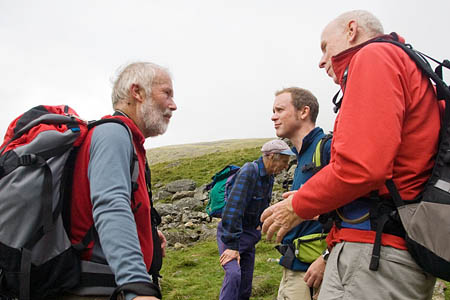
Richard Leafe is no stranger to the Lake District's fells. Here, he is seen with Sir Chris Bonington and Jos Naylor on Scafell Pike
“But I don’t want your readers to be alarmed in that respect. It doesn’t mean there’s going to be a massive hike in car park prices. We’re not intending to do that, but we do want to make sure we keep those rates at a market level that we think the visitors can sustain.
“It’s important to note that in our car parks, you’re not just paying for the privilege of parking, you’re also contributing to looking after the national park. That’s an important message, I think.”
Another important cog in the machinery of running the national park efficiently is the way the authority works with other bodies.
“In the Lake District, we run a thing called the Lake District National Park Partnership, which has got all the local authorities, all the statutory agencies, the third sector, the business sector, the tourist sector,” Mr Leafe said.
“They are all represented on that board, and we just agreed with them a management plan for the whole of the park. We call it a partnership plan and that really is the key thing that delivers a really good national park for us because it makes sure that all those public and private resources that are currently being spent are spent well and streamlined towards clear vision and one set of priorities.
“And I think if we get that right and we’re actually going to put more money into that and not less, we will deliver a better national park even through this tough financial time that we’re facing.
“I don’t think your average hillwalker will notice a difference for any of the cuts and we’re quite determined they won’t. So we’re going to really make sure we use particularly our volunteer base and remember we’ve got 460 volunteers that work among these issues and point out problems and point out issues with footpaths and we’re able to come and deal with those where it’s a maintenance issue.
“We’ve also had a big programme running for some time called Fix the Fells and we’re determined to see that continue beyond the end of next year when its Heritage Lottery grant runs out. But really, that’s a much bigger job than we can work on. That’s a huge challenge. We’ve spent £5m over the last 10 years on that kind of work and we need another £5m for the next ten years, so we’ll do our best to secure that on the external funding market.”
The Government is also looking at the make-up of national park authorities, something the chief executive is keen to follow. “We’re interested in what the Government is suggesting. They want us to work out how national park authorities can be more accountable to local people,” he said.
“And we strive to do that through the way we work through our partnership and in particular through parish councils and other local community groups and as part of these reductions in budgets, we’re not going to reduce the amount of money we spend on engaging with the local communities in the park and in fact if anything we’re going to increase the amount of resources we put into that.
“The Government is interested in how we might change our governance arrangements; how many members we have and how those members are appointed and we’re just embarking on a consultation at the moment with the partnership and the parishes as to how we might do it and we’re having some consultations with the membership as well and we’re looking at the possibility of recommending to Government that we reduce slightly the membership of the authority but we want to make sure we do that in a way that doesn’t make local representation harder to achieve on the authority as a whole, so there’s a fine balancing act to go through there.
“We haven’t made up our mind on what the final proposals may be but we’re interested in hearing what this consultation may throw up.”
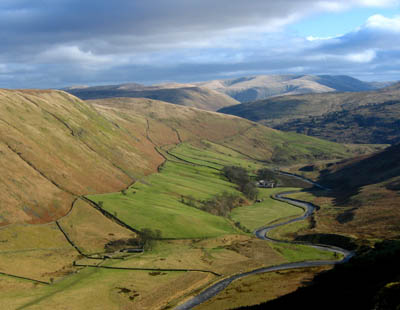
Borrowdale and the western Howgills. An eastwards extension would take in these areas. Photo: Edmund Hoare
And despite all the cuts, the Lake District national park boss said expansion of the park is still a possibility.
He told grough: “The enlargement of the LDNP is still on the cards and I think there’s been some misrepresentation of Natural England’s position in this respect and it remains on the cards and always has been. They have to finish going through their process consulting people and advertising and coming to conclusions for their board on what the proposals are going to be, and my understanding is they haven’t quite finished that process yet and may want to consult further as a result of the consultation exercise that’s been held before the board of Natural England makes its recommendations known in the New Year, in 2011.
“They then will obviously arrive on ministers’ desks and it’s up to ministers to decide what they want to do with it, but I haven’t heard either from Defra or from anybody else that they are not interested in taking these proposals forward. I think it’s because people are waiting for the proposals to complete and I very much look forward to hearing the outcome of that because there are some fantastic landscapes over in the eastern side of the Lake District that, in my view, are deserving of national park status.”
As the cuts bite, it’s worth noting just how much the Lake District’s visitors benefit the local economy, especially the outdoors enthusiasts – walkers, climbers, paddlers, mountain bikers and all the others who come to enjoy some of England’s finest scenery.
Mr Leafe said: “The Lakes bring £1.3bn of visitor revenue and a good proportion of that can be attributed to the outdoor sector.
“It’s a really significant chunk of it, so we are talking about hundreds of millions of pounds per year from the outdoor sector coming to the Lakes. It’s a really, really significant piece of the economy which is partly why we’re really behind this Adventure Capital programme we’ve got running here in the Lakes, which is all about providing a wider range of opportunities for a bigger audience to engage in physical activity – outdoor activity – in the national park and it’s a great campaign.”
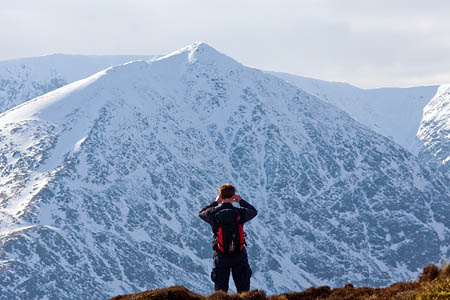
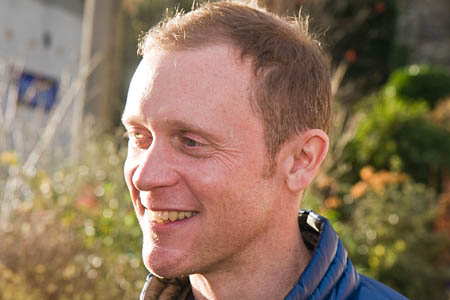
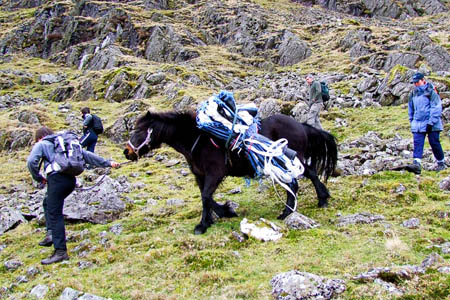
Billy Hughes
21 December 2010Re great north swim.
As a keen openwater swimmer I would comemnt that not having it in Windermere would be a start.
Windermere is the dirtiest of the lakes, with effluent from Ambleside, Windermere and Bowness pouring into it as well as the pollution from motor boats.
These problems cannot be sorted overnight and require considerable investment by United Utillities - something beyond Mr Leafes control.
Coniston would be a far better venue, with the added advantage of not blocking the Lake District's main artery.